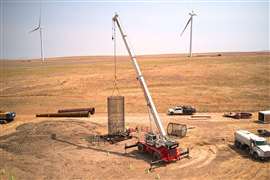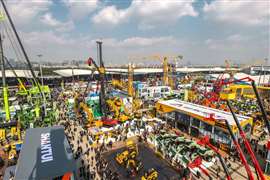How to maximize your insurance experience
03 August 2023
As a crane and rigging operator or specialized carrier, you understand the importance of having comprehensive insurance coverage to protect your operation from potential risks.
 Applying robust risk management practices is crucial to continued success.
Applying robust risk management practices is crucial to continued success.
However, navigating the complexities of commercial insurance can be daunting, leaving you wondering how to tailor your coverage to meet your specific needs. While it can be overwhelming, you should strive to maximize your insurance experience allowing you to optimize your coverage and make the most of your relationship with your insurance advisors.
Seek Out a Specialist: Working with an agent who specializes in your industry is paramount to your success as they have extensive experience they can bring to the table. A knowledgeable agent will understand your business’s intricacies, have access to specialized insurance products and be well-versed in the regulatory requirements specific to your operations. Establishing a strong relationship with a specialist will provide you with valuable guidance and support throughout the insurance process. You should work closely with your agent to ensure your policies adequately cover your operations, assets and potential liabilities.
Assessing Your Unique Risk: Every crane, rigging and specialized operator has its own set of risks and exposures. Begin by conducting a thorough assessment to identify the specific hazards your operation faces. Consider factors such as the types of jobs you focus on, the geographical areas in which you operate, the types of lifts and moves that you specialize in and the requirements that are necessary to enter specific contracts. Understanding your unique risks is crucial to ensuring that your insurance coverage adequately addresses potential vulnerabilities.
Tailoring Coverage to Meet Your Needs: Discuss your business’ requirements with your insurance advisors and provide them with comprehensive information about your operations. Be upfront and honest with your advisors, sharing the good, the bad and the ugly. They will assess your risk profile and recommend suitable coverage options. Your agent can help you tailor your policy to include coverages to protect all aspects of your operation.
Understanding Policy Exclusions and Limitations: While it’s essential to understand what your insurance policy covers, it’s equally important to familiarize yourself with any exclusions and limitations that may apply. Policy exclusions are specific risks or situations that your insurance carrier will not cover. Limitations, on the other hand, are conditions that may restrict coverage or impose certain requirements. By having a clear understanding of these provisions, you can proactively manage your risks, implement necessary safety measures and explore alternative coverage options if needed.
Consider Alternate Insurance Products: Many operators are exploring alternative risk financing methods to manage their risk. Captive insurance, risk retention groups and self-insurance programs are gaining popularity as companies seek to control costs, tailor coverage to their specific needs and gain more control over their insurance costs by betting on themselves. These alternative risk financing methods require a thorough understanding of the program you are joining, so be sure to take advantage of educational opportunities if you are exploring new options. Insurance carriers continue to innovate with new products to meet the unique needs of this industry. One example of this is National Interstate’s Boomerang® program, which was designed for operators who want to take on a palatable level of risk but aren’t ready to join a captive. Boomerang gives crane, rigging and specialized carriers the best of both worlds: the upfront cash flow advantages of a deductible program coupled with the control and potential rewards of a group alternative risk program. When considering new options, you should always consult with insurance professionals to assess feasibility and potential benefits specific to your company.
Reviewing Your Policy Regularly: The needs of your operation are subject to change over time. It is crucial to review your insurance policy regularly with your agent, especially when there are significant changes to your operations, equipment or regulations. Schedule periodic meetings with your agent to discuss modifications needed to align your coverage with your evolving needs. This proactive approach ensures that your policy remains up to date and continues to provide the comprehensive protection that you need.
Risk Management and Loss Control: An effective loss control program is instrumental in mitigating potential hazards and reducing claims. Collaboration with your insurance advisors to develop a comprehensive risk management strategy is key. This may involve implementing safety protocols, providing ongoing employee training, conducting regular equipment maintenance and performing thorough inspections. Demonstrating a commitment to risk management can result in more favorable insurance terms and premiums. Applying robust risk management practices is crucial to your continued success. Conduct regular assessments of your operation, identifying potential risks and implementing preventative measures will minimize the likelihood and impact of losses. Pre and post-loss services can help you identify potential risks, implement preventative measures and identify trends.
Understand the Value of Data: Your insurance team may be able to provide meaningful insights that prove invaluable as you can consider where you need to improve, how you stack up to your competitors and where you shine. By working with industry specialists and experts you can find insurance allies that allow for anonymized data-sharing and benchmarking tools.
Take Advantage of Discounts and Subsidies: Check with your insurance team to see if policies include subsidy or discount programs to help lower expenses. National Interstate offers several programs ranging from an Automated Event Recorder (AER) subsidy to discounts with Industrial Training International. Through proper utilization programs such as an AER program can reduce unsafe driving behaviors, mitigate claims costs and take a proactive approach to your safety program. Make it a priority to learn what is included with your insurance policy and take advantage of cost saving opportunities that better your operation.
Building a Strong Relationship with Your Insurance Carrier: While your agent is your primary point of contact, it is beneficial to establish a strong relationship with your insurance carrier. Engage in open communication with your carrier to ensure they fully understand your business operations and risk management efforts. Working with an insurance carrier who specializes and understands the nuances specific to the needs of crane, rigging and specialized carriers only benefits you. Maintain detailed records of safety protocols, inspections and training programs, which can be shared with your carrier to showcase your commitment to safety and risk reduction. Building a relationship based on transparency and trust can pay off dividends in the long run.
Industry Advocacy: It is crucial to consider the value of collaborating with insurance professionals who know and are deeply involved in your industry. Not only will they better understand your unique needs and intricacies of your business, but they can also help drive industry wide improvements through advocacy with organizations like the SC&RA and others.
Personalizing your insurance experience is essential for optimizing your coverage and ensuring adequate protection, while enabling your business to thrive.

THE AUTHOR
Lauren Fronczek is AVP of specialty transportation for National Interstate Insurance Company based in Richfield, OH. National Interstate Insurance is rated “A+” (Superior) by A.M. Best (rating affirmed on December 16, 2022.)




